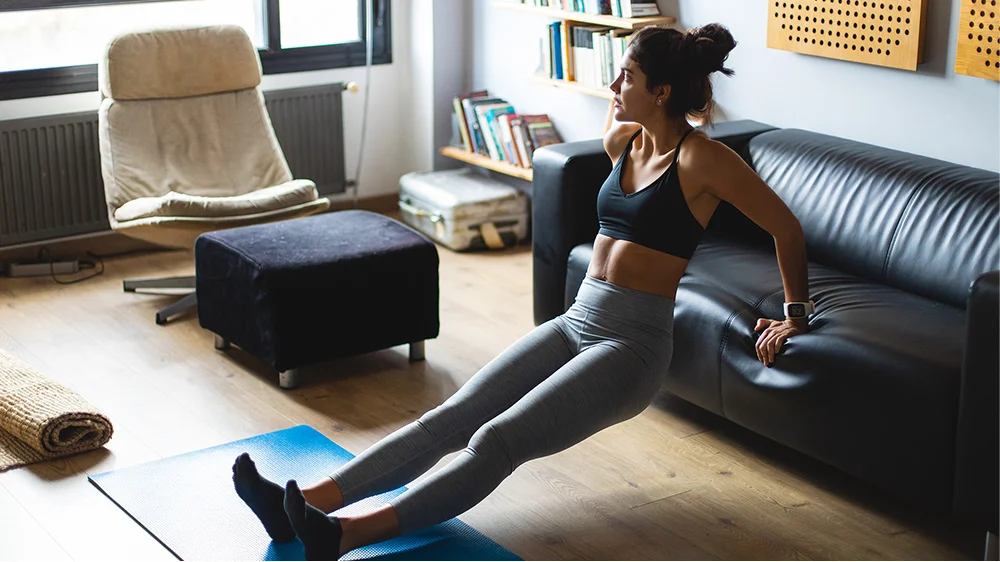
Consult any sleep expert about exercise and sleep; they’ll likely tell you that exercise is an important (yet often overlooked) part of sleep hygiene. And while exercise is recommended, it usually comes with one caveat: don’t do it too late in the evening, or your sleep will take a hit. Now, vigorous exercise will probably always be a no-no, but new research shows that light to moderate-intensity resistance exercises every 30 minutes in the evening may boost sleep duration by as much as 27 minutes. (1)
For the study, participants wore activity trackers for seven consecutive days, allowing researchers to assess their physical activity and sleep patterns. Then, in a controlled laboratory setting, 30 participants ranging in age from 18 to 40 were tasked with completing two four-hour sessions. (1) In one session, they remained seated for 4 hours; in the other, they completed 3 minutes of exercise every 30 minutes, again over 4 hours. (1) The exercises consisted of 3 rounds of 3 simple resistance exercises (chair squats, calf raises, standing knee raises with straight leg hip extensions) performed for 20 seconds each.(1)
Ultimately, the results showed that when compared to prolonged sitting with light activity, participants slept for an additional 27 minutes, compared to prolonged sitting. (1) The average sleep duration after exercise was 7 hours and 12 minutes, while the average sleep duration after prolonged sitting was 6 hours and 45 minutes. (1) Beyond an extended sleep duration, researchers found no differences in sleep efficiency and the number of nighttime awakenings between the two interventions. (1)
How Beneficial are Exercise and Sleep
In terms of what this could mean for sleep hygiene as we know it, the researchers wrote, “These results provide further evidence that the prevailing guidance to avoid physical activity in the hours before sleep should be removed from sleep hygiene recommendations.” (1)
Dr. Jennie Stanford, an Obesity Medicine Physician and medical contributor for Drugwatch, tells Sleepopolis that “While longstanding recommendations to avoid exercise close to bedtime as it may be too stimulating and ultimately interfere with sleep efficiency, recent research (to include this one) suggests a potential benefit of moderate-intensity exercise in the evening.” (1) (2)
Stanford adds, “Exercise can promote sleep in several ways. Not only can it reduce stress and promote relaxation, but exercise can also do some pretty heavy lifting to stabilize your mood and increase your production of the sleep hormone melatonin. ” (3)
For those adding exercise to their sleep hygiene practice, Stanford says everyone is different, and a little trial and error may be needed to find the right combination of exercise and sleep.
“It’s important to consider when you exercise and how it appears to help your sleep,” she says. “Try morning and afternoon exercising on separate days and monitor how you feel. If afternoon exercise seems to make it harder to fall asleep (after removing any other contributing factors), perhaps morning exercising may be better for you.” Either way, she says, the guidance on vigorous exercise still stands — don’t do it within 2 hours of going to sleep.”
Other Exercises You Can Do Before Bedtime
Chair squats and calf raises may not be for everyone. To that, Amanda Grimm, a UK Athletics certified Running Coach and qualified Personal Trainer with We Run, says, “Any type of low-impact exercises would be suitable to perform in the evening as part of regular breaks from sitting.” Ultimately, she says, “Repeating some gentle movements in short bursts can help increase circulation without raising the heart rate too much.” (And we now know it can help your sleep, too.)
Ahead, Grimm shares some examples of exercises that can be done in the evening, even whilst watching TV.
Knee raises. With one hand on a chair for balance, lift the knee closest to the chair to hip height (or as high as you can). Repeat this 10 times, then move to the other side of the chair and do the same with the alternate knee.
Wall squat. While supporting yourself against a wall, stand with your feet shoulder-width apart about 1 to 2 feet away from the wall. Slide your back down the wall and bend your knees until you are in a sitting position. Hold for 10 seconds, then rise back up slowly. Stand and rest for a beat, then repeat 10 times.
Resistance bands. Try standing on a band, wrapping each end around your hands, tucking elbows into your sides, and curling your arms up as high as you can towards your biceps. Keep your arms close to the body and repeat this slowly for 30-60 seconds.
Standing the same way, take the band out to your sides and lift your arms to the scarecrow position. Hold that position for 10-30 seconds, then lower your arms to your sides. Repeat 10 times.
Yoga. According to Grimm, yoga is a great way to get some movement in during the evening without elevating the heart rate too much. The best yoga poses for sleep are:
- Child’s Pose (Balasana)
- Legs Up the Wall (Viparita Karani)
- Corpse Pose (Savasana)
This may sound like a short exercise routine, but we suspect it’s a good start for beginners. As an added benefit, Grimm says, “Repeating this short flow will allow you to stretch and relax your muscles and calm your breath.”
Sources
1. Gale JT, Haszard JJ, Wei DL, et al. Evening regular activity breaks extend subsequent free-living sleep time in healthy adults: a randomized crossover trial BMJ Open Sport & Exercise Medicine 2024;10:e001774. doi: 10.1136/bmjsem-2023-001774
2. Stutz J, Eiholzer R, Spengler CM. Effects of Evening Exercise on Sleep in Healthy Participants: A Systematic Review and Meta-analysis. Sports Med. 2019;49(2):269-287. doi:10.1007/s40279-018-1015-0
3. Pobocik KM, Rentzell SAV, Leonard AJ, Daye AN, Evans ES (2020) Influence of Aerobic Exercise on Sleep and Salivary Melatonin in Men. Int J Sports Exerc Med 6:161. doi.org/10.23937/2469-5718/1510161
4. Grimm, Amanda. Author interview. July 18, 2024.
5. Stanford, Jenny. Author interview. July 18, 2024.

























